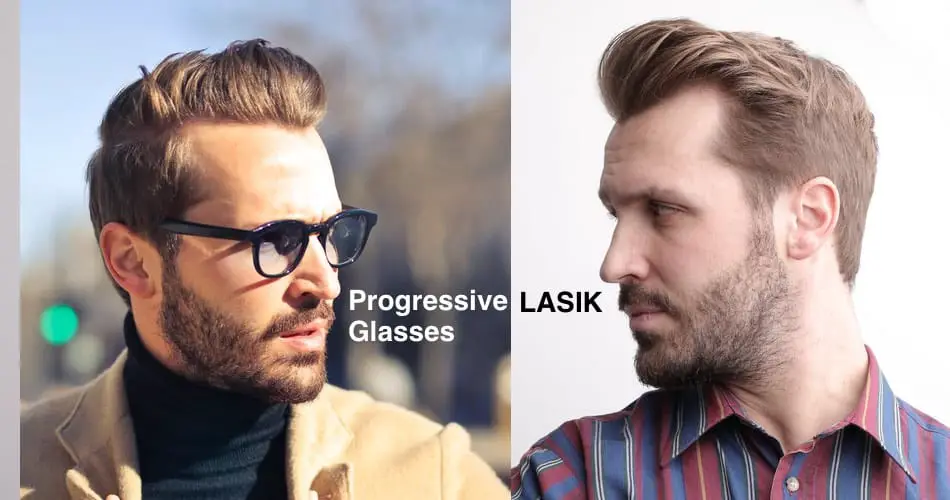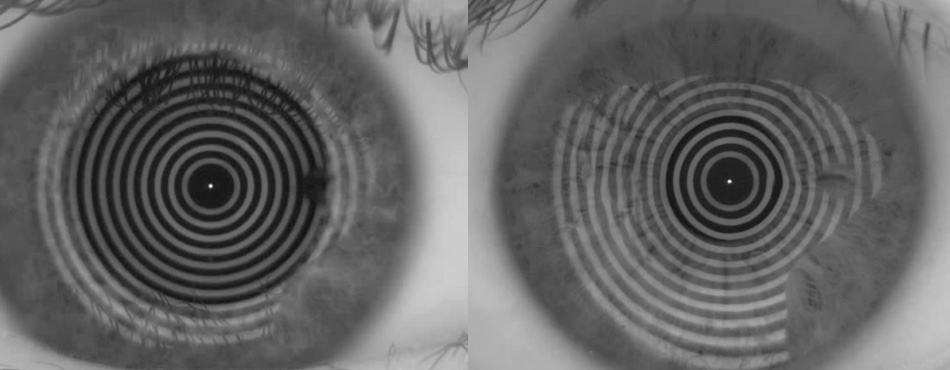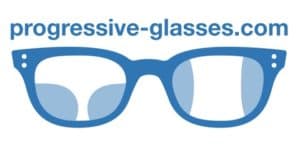Progressive glasses and LASIK are both reasonable ways to correct your vision if presbyopia makes it hard for you to read. Here in this article, we will discuss the advantages and the disadvantages to see which one is best for you?.
If you don’t want to deal with glasses anymore of course LASIK is the way to go for you. But it can come with the downside of halo effects and glare at night. This usually happens if your corneas get reshaped by the laser with your prescription for distance vision and reading right in front of your pupil. With these changes made to you cornea a slight loss, in contrast, is to be expected.

Those things are no problem at all with progressive glasses. But of course they also come with some disadvantages. As opposed to LASIK, progressive glasses will force you to perform eye movements in certain areas of the lenses to be able to read, see your screen clearly or look into the distance for example while driving.
Overall most people achieve a higher visual acuity with glasses compared to Corneal compensation of presbyopia (LASIK). In a lot of cases, many authors note down a loss of two lines (more info here) in the visual acuity which is definitely relevant.
Technology definitely evolves over time and with more advanced algorithms for LASIK you might end up with better results. But now I will dive into the topic and tell you about my experiences and the experiences of my clients.
| LASIK | Progressive Glasses | |
| Higher Order Abberations | more | less |
| The necessity to wear eyeglasses | in some cases | yes |
| Limited eye movements | no | yes especially in the lower half of the lens |
| Contrast | probably negatively affected | best possible result |
| Vision at night | in most cases negatively affected (Halo effects) | best possible result |
| Reading above your head | possible | not possible |
So this easy to understand chart will give you a good comparison of LASIK and progressive glasses. Keep in mind here that visual experiences are highly subjective. But there are some objective parameters here that make the whole topic easier to digest for you. The following points vary from person to person.
- Your cornea has a certain shape and thickness
- Your pupils’ diameter and how it reacts to brightness
- The height of your anterior eye chamber
- How much reading support do you need from LASIK or glasses?

The picture shows two different eyes pupils that vastly vary in size. This parameter alone radically influences the outcome of the LASIK on how much HALO effects you could have after surgery. But if you asked a friend if he is is totally happy with the outcome of the LASIK you would tend to think this might work with your eyes too. Maybe now but not anymore in a few years.
As you age over time you will probably need more support for reading. When it comes to the reading support in LASIK a “second” curve is added so you can read the more reading support you need the more the second curve has to deviate from your distance vision shape. And as the difference grows in curves on your cornea so do the visual disadvantages I already mentioned in the table above.
Do not get me wrong here. The same is true for progressive glasses. As soon as you get in your 50s or 60s the visual results will be worse because of the stronger periphery blur you can expect on the left and right. So on the one hand with progressive glasses, there is a strong need for you to point your nose into the directions you want to see clearly in if you want to read or on the other hand you need to deal with more contrast loss with if you choose LASIK.
But What Should I Choose Now? Lasik or Progressive Glasses?
From my experience, you should test the things that are available to you. By that I mean of course you could test progressive glasses and probably the optician offers a money-back guarantee so you don´t have any risk if it is not the solution for you.
But when it comes to LASIK before the treatment is done you should definitely simulate postoperative visual impressions and verify your acceptance by using multifocal contact lenses first.

If the consultation is good the doctor will show you what results you could expect by letting you wear multifocal contact lenses as the shape of those contacts is pretty similar to your cornea after it was treated with LASIK for presbyopes.
Usually what happens is you will experience what it actually means to have the prescription for reading and for distance vision on your eye simultaneously. This produces a slightly defocused image and text that was written in black tends to get a lighter grey tone. That is what I meant with the loss in contrast.
After you tried it and tested it during your daily routines you will know what works and what works not. With this experience, you will have a good base for a sound decision.
Get a Pair of Glasses in Addition to Your Progressive Glasses or Lasik Too
Now you will probably ask yourself why you would still need an extra pair of glasses if you already got all distances built into your progressive lenses and you have LASIK done for all distances. Well, the thing is as good those all in one solution are they are both far from perfect. So if you are over 55 years old and you want to get very detailed work done in close range the progressive glasses and LASIK will not get the job done.
A classic stronger single vision lens that is made for reading will be a great supplement in those situations. Some people tend to prefer to buy an additional pair for reading and some for distance vision. For example, in some cases, you can reduce the negative effects of LASIK a bit by using a pair of glasses for distance vision only.
If you choose the LASIK and you are only driving seldom at night and otherwise you would not need them you would be free of glasses most of the time. The same is true for progressive lenses. I bet most of the time they will do a good job for you. But off course they have their limits.
And I hope I made clear in this article what the differences are when it comes to LASIK vs progressive glasses. I have a lot of customers that are very satisfied with the results of their LASIK treatment. But all of them tell me during the refractions that dealing with the disadvantages is easier for them compared to wearing glasses.
In most cases, they don’t need to see as clear as they could. If it is in the realm of 20/20 vision it is totally ok to them. When in reality some of them could experience an even better visual acuity. Having 20/20 vision is definitely really good but if your standard of visual acuity is 20/12.5 you will be probably dissatisfied after LASIK if your demand is to get to this standard after LASIK.
I wish you a great day.

